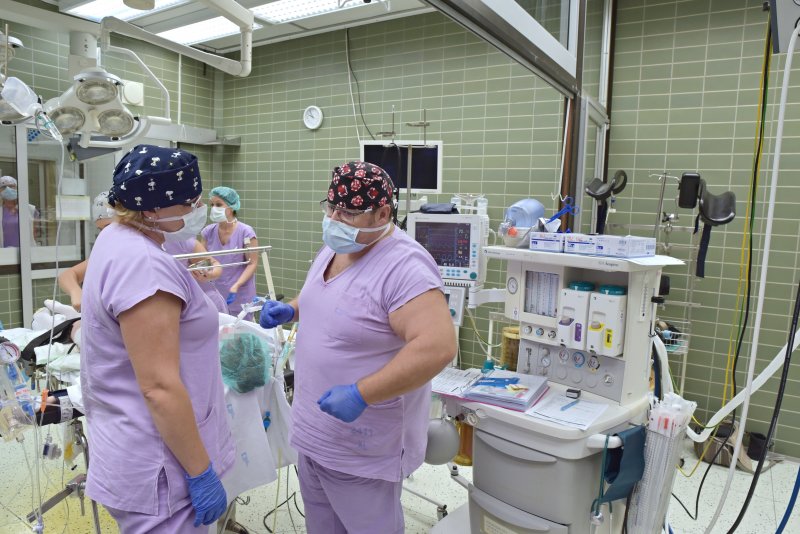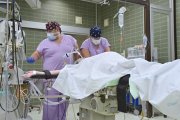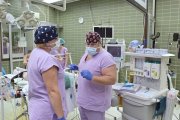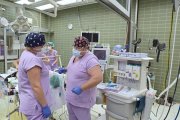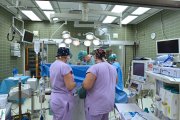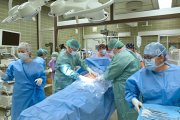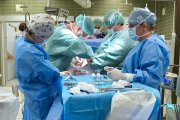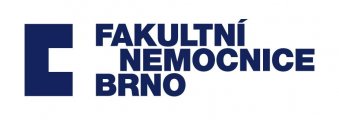This case is unique not only on the Czech scale, but also worldwide. The doctors of the Brno University Hospital said that nowhere else in the world have they ever managed to keep a baby in the mother almost until the baby was mature for birth. This is an extremely rare case that will certainly enter the history of Czech and world medicine. It is also evidence of the huge strength of incipient human life and huge strength of mother's body that managed – with the help of doctors and nurses – the situation very well and gave life to a baby despite its own brain death.
The 27-year old woman was in her 16th week of pregnancy when she was transported by a helicopter to the Emergency Unit of the Brno University Hospital on 21 April 2019 with the anamnesis of arteriovenous malformations with manifestations of epilepsy after she was found unconscious. The rescue workers were maintaining her breath activity. Major bleeding in her left brain hemisphere was found in a CT scan. Her spontaneous breath activity disappeared at 4.00 PM and a clinical neurological examination confirmed areflexia, i.e. brain death. This was subsequently confirmed in an examination and by the disappearance of brain potentials.
From this moment on, the doctors and non-medial staff of the Anaesthesiology, Resuscitation and Intensive Medicine Clinic of the Brno University Hospital and the Faculty of Medicine of Masaryk University together with the doctors of the Obstetrics and Gynecology Clinic of the Brno University Hospital and the Faculty of Medicine of Masaryk University were doing their best to stabilise vital functions in this woman and so protect the fetus in mother's body.
Complex long-term resuscitation care was introduced that includes – by default – care of hearth activity and lungs and kidneys functions. Maximum care was given to maintain the integrity of the skin cover and prevent infectious complications. Special attention was paid to nutrition, so that not only the energy demands of the mother but also optimum growth and development of the fetus could be ensured.
On Monday 24th of June 2019 a gynecological consilium confirmed the weight of the fetus: 980 g with the hope that the fetus was developing. The woman was monitored by the doctors and nurses on a regular basis and a lot of medication was served to her. Further examinations were done to keep the fetus in the body alive.
July brought some hope that the doctors of the Brno University Hospital set the right care, because the fetus was gaining weight. In the middle of July the weight was 1500 g, with a physiological finding. A team of non-medical staff was highly devoted and professional.
In the middle of the month on 15th August 2019 on the Brno Day her pregnancy was terminated in the Central Operating Theatres of the Brno University Hospital in week 34+3 in the afternoon by doing a cesarean section. The newborn girl had 2130 g and 42 cm.
Basic questions:
In what condition was the woman brought to the Anaesthesiology, Resuscitation and Intensive Medicine Clinic of the Brno University Hospital?
The pregnant woman was brought in a state of deep unconsciousness, with falling body temperature, stable circulation and her breathing airways were secured by the rescue workers and she was being vented using a device. The hearth activity of the baby was all right.
What caused her clinical death?
Venous malformation of the brain with subsequent bleeding.
How many week did the woman spend in the hospital (hooked up to devices) before the girl was born in a cesarean section?
Almost 17 weeks.
Were there critical situations during her pregnancy?
Complications – infections appeared four times and required the use of targeted ATB treatment plus all the medical had to be selected with a view to the growing fetus nad no teratogenic effects were allowed.
What was the driving force behind the woman managing to maintain her vital functions and let the fetus develop?
A very good health condition of the women before her stroke, quick arrival of the rescue team, high-quality resuscitation care minute after minute by all medical workers involved.
Do you have any information about a similar case anywhere in the world?
About 20 similar cases could be described in the world.
What makes your case unique?
It is probably the duration of hospitalisation: 117 days, with corresponding size and maturity of the fetus we managed to achieve (more than 2000 g, which is exceptional).
Communication Centre
Brno University Hospital
phone: +420 532 232 193
e-mail:


